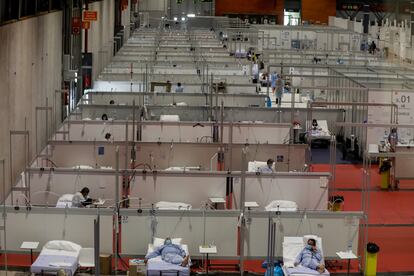Hospital bed numbers will be key requisite for Spain’s deescalation phases
According to orders published today, the government will study applications from each region before a province moves to the next stage

The Spanish government published a series of orders on Sunday that detail the requirements that will be necessary for each province to pass from one phase to another during the deescalation of coronavirus confinement measures that will officially begin on Monday. The only essential quantitative requirements, according to the Official State Gazette (BOE), will be the availability, access to or capacity to install between 1.5 and 2 intensive care beds and between 37 and 49 beds for the seriously ill for every 10,000 inhabitants in a five-day period.
The deescalation phases will be introduced asymmetrically across Spain in each province, and the dates of passing from one phase to the other is likely to vary depending on the situation of each area. Spain is currently in Phase 0, although four of Spain’s islands – Formentera (Balearic Islands), La Gomera, El Hierro and La Graciosa (Canary Islands) – will automatically enter Phase 1 on Monday, given the low levels of coronavirus infections registered there.
Once a province has entered Phase 1, regional governments will have to make their next requests at least a week in advance.
The rest of Spain’s provinces will have to wait until May 11 before they get the chance to move to the next phase. Each regional government will have to send its request to do so before 2pm on May 6. The Health Ministry will study the applications and will try to reach a consensual decision with each region, although the ministry will have the last word. Once a province has entered Phase 1, regional governments will have to make their next requests at least a week in advance.
“During this process of co-governance [between the regions and the central government],” the order published today reads, “the regions and the cities of Ceuta and Melilla can pass specific deescalation proposals for their territories to the Health Ministry [...] as well as presenting an activity that is not included in the permitted activities in the different phases.”
The deescalation process will not be automatic nor mathematic. As well as the aforementioned requirements, the following factors will also be taken into account: the possibility of isolating those infected with the coronavirus, and the control of confirmed sources of contagion; early-warning systems and epidemiological monitoring; the identification and rapid containment of sources of potential contagion; the capacity of the primary healthcare and hospital systems; the mechanisms to guarantee the necessary collective protection measures; and the epidemiological progress in the territory in terms of transmission and active cases.
The ministry will call on the regions to guarantee the availability of “sufficient healthcare professionals”
What’s more, the ministry will call on the regions to guarantee the availability of “sufficient healthcare professionals.” A specific number is not provided, but the recommendation is that it is not lower than the existing figure on March 27, when the second extension to the state of alarm was implemented.
Until now, the government had been considering relaxing confinement measures in each province according to the percentage of free beds – both regular and ICU – that each territory had at the time of changing phase. According to the BOE published today, this criteria has been substituted for one that refers to installed beds, and not available beds.
English version by Simon Hunter.
Tu suscripción se está usando en otro dispositivo
¿Quieres añadir otro usuario a tu suscripción?
Si continúas leyendo en este dispositivo, no se podrá leer en el otro.
FlechaTu suscripción se está usando en otro dispositivo y solo puedes acceder a EL PAÍS desde un dispositivo a la vez.
Si quieres compartir tu cuenta, cambia tu suscripción a la modalidad Premium, así podrás añadir otro usuario. Cada uno accederá con su propia cuenta de email, lo que os permitirá personalizar vuestra experiencia en EL PAÍS.
¿Tienes una suscripción de empresa? Accede aquí para contratar más cuentas.
En el caso de no saber quién está usando tu cuenta, te recomendamos cambiar tu contraseña aquí.
Si decides continuar compartiendo tu cuenta, este mensaje se mostrará en tu dispositivo y en el de la otra persona que está usando tu cuenta de forma indefinida, afectando a tu experiencia de lectura. Puedes consultar aquí los términos y condiciones de la suscripción digital.








































